One thing I’ve observed during the lockdown is how eerily quiet it is in the evenings!
With a reduction in the number of cars on the road, planes in the air, and trains on the tracks many people across the UK have witnessed the effects of noise pollution. I have found however, that the silence didn’t seem to last long as it was soon replaced by the constant buzz of lawn mowers, the regular engines of delivery vans and the weekly clapping that occurs on Thursday evenings!
In years to come, when future generations study this period I would like to think that it is those sounds which are uniquely part of 2020. Sound evokes memories; they can transport you back to a place of happiness or sadness and are inter-generational.
Why am I going on about sound? Well, this week I bring you the second NLHF project Special Collections supports: Unlocking Our Sound Heritage.
The Project
The Unlocking Our Sound Heritage (UOSH) project, is a partnership project led by the British Library, with funding from the National Lottery Heritage Fund that involves ten regional hubs across the UK. The project aims to preserve and provide access to as much as possible of the nation’s rare and unique sound recordings.
Why Save Sound?
Professional consensus is that we have approximately 15 years in which to save many of our sound collections before they become unreadable and are effectively lost! This can be largely attributed to two factors: format degradation and technological obsolescence.
The Midlands Hub
Based at the University of Leicester, the Midlands Hub reaches out to collection holders across the region, working with sound collections from archives, libraries, museums, private organisations and individuals.
Since October 2018 we have worked with partners across the region to digitise, catalogue and make accessible their sound collections.
Highlights from the first year include finishing two large BBC Radio Leicester collections: Digging Out the Past and Platform. Both of these would not have been possible without the great work of our volunteers, so if you’re reading this – thank you!
We’ve thoroughly enjoyed working alongside our volunteers, many of whom develop new skills. Don’t take our word for it though, read about their experiences in digitisation, cataloguing and editing sound.
Work during the closure period
The UOSH project still continues! Find out how the team have adapted their work during this time…
Richard Wheelband (Digitisation Engineer)
My day to day role of digitising collections cannot be carried out at home so alongside helping the cataloguers, I have been learning new IT skills and problem solving in order to be able to create pre-submission information packages (pSIP) at home for collections I have already digitised.
- To create a pSIP I have to retrieve collections files from the University server and send them to the British Library server so I can marry up the audio files to the catalogue entries and add my own technical metadata. To successfully do this I had to set up a VPN, FTP and software to checksum the files. Once I had downloaded collection files from the University I would use a bit of software to checksum the .md5 files and audio files that check the data in the file so see if it has downloaded correctly without error.
- The next step was to set up a file transfer protocol (FTP) so I could remote onto one of the British Library servers and transfer the audio files with the .md5 securely to a folder for later use.
- The last step was to set up a virtual private network (VPN) to access the British Library server and the custom pSIP building page where the audio files are linked up with the metadata and cataloguing information and when ingested will eventually be available on a web player.
Ruth Maguire (Cataloguer)
The role of cataloguer lends itself quite well to home working. At the most basic level if I have access to the audio files, I can catalogue the content (although nothing is ever this simple in practice!). For the first couple of weeks of lockdown, the working process was extremely slow and I needed to download quite a few applications to help manage this.
My work schedule has been slightly different than others because these are also my few last weeks before I head off on maternity leave so I have been trying to tie up the odds and ends of different sound collections before I leave.
I have mainly been cataloguing a collection of oral history interviews on the topic of ‘Life Stories’ of people from Worcestershire. With some interviews originally recorded in the 1990s, interviewees recall events from the turn of the 20th century and discuss many fascinating details about the changing landscape of Worcester and its surrounding villages. Topics include: childhood, schooldays, rural and urban working and wartime stories.
Alongside listening to these recordings, the cataloguing process also includes capturing descriptive metadata from the tape boxes and combining this with the digitised audio file (.WAV) into a Submission Information Package (SIP) which gets ingested into the British Library’s digitial repository.
Sarah Wood (Cataloguer)
Like Ruth, I have been working with digitised collections to listen and describe recordings from collection partners. I’m currently working on collections from Derbyshire Record Office, which were originally recorded on 1/4″ tape reels, cassette tapes and CD-Rs. Many of these collections only have a brief title written on the tapebox to describe the tape’s contents (some only have one word!). This is a challenge when starting the cataloguing process, however it is immensely satisfying to provide an accurate and informative description which will help researchers in the future.
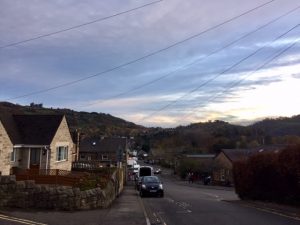
Derbyshire Record Office is situated in the idyllic town of Matlock – my photo doesn’t do it justice!
Highlights from this collection include a mini series entitled ‘Our Village: Holmesfield in 1958’ (original title on box was ‘Holmesfield Parish Council’!) which features a keen recordist conducting interviews with villagers in order to capture life in Holmesfield in 1958 – what a pioneer!
The collection is a researcher’s dream, as the recordings demonstrate not only the changes in the rural landscape, but also provide a reflection of society in the 1950s. Linguists will love the collection as it’s rich in local dialect and the Derbyshire accent.
What I discovered whilst cataloguing is that many of the buildings mentioned in the interviews no longer exist: the village post office and local shop are now distant memories.
My favourite recordings in the collection? A meeting of the 1st Holmesfield Brownies who, after reciting the opening prayer, break out into the cheerful song:
“We are the Brownies, this our aim: lend a hand and play the game.
This is what we do ourselves, think of others not ourselves…”
I’ve also been working on the WWII Reminiscences Project, a collection of 278 cassette tapes of oral history interviews conducted by Hereford and Worcester Record Office (now Worcestershire Archive & Archaeology Service) between 1995-2000. The interviews cover a diverse range of topics and explore a variety of occupations undertaken by individuals during the war period. Many of the interviewees recall their memories of VE Day: where they were, how it was celebrated and the emotions associated with it. Fascinating accounts, which tie in very nicely with the 75th anniversary this week!
Mandeep Kaur-Lakan (Rights Clearance Officer)
At the moment I’m researching rights holders in the recordin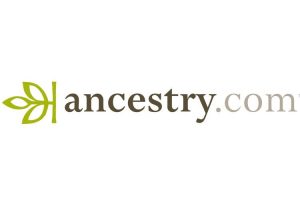 gs for the WWII Reminiscences Project. I use the information that interviewees provided at the time to trace the rights holders and their families. There are lots of rights holders in the recordings so this takes time. Many of the addresses given in the 1990s are no longer valid and some participants are no longer alive.
gs for the WWII Reminiscences Project. I use the information that interviewees provided at the time to trace the rights holders and their families. There are lots of rights holders in the recordings so this takes time. Many of the addresses given in the 1990s are no longer valid and some participants are no longer alive.
I use search engines and websites such as Ancestry to cross reference information with data from Electoral Registers and the Civil Registration index of births, marriages and deaths. This process is called a Diligent Search and all of the results are logged in spreadsheets.
Colin Hyde (Project Manager)
My role as project manager is to try and make sure that all the team can work from home as well as possible, and then to start thinking about how the enforced break affects the progress of the project. We want to preserve as many collections as possible from our project partners across the Midlands, but this will now depend on how soon everyone can return to ‘normal’ work, so liaising with our partners is vital. The current situation also gives us time to reflect on what we have achieved so far, so I want us to take the opportunity to highlight the collections we have already preserved.
Collection highlight? The Donnelly and Thoms Collection, from Coventry University Library. This contains 50 oral history interviews with people who worked in the car industry in Coventry, during the 1970s and 1980s. These were produced as part of research for the book ‘The Motor Car Industry in Coventry since the 1890s: origins, development & structure’ (1985) by Professor Tom Donnelly and David Thoms. Many of the interviewees were employees for British manufacturers such as: Jaguar, Daimler and British Leyland.
Keep updated on the project here or follow us on twitter @MidlandSounds.
For enquires or volunteer opportunities contact us on: uosh@leicester.ac.uk
That’s all for the Keep Calm and Scroll On! series. However be sure to keep an eye out for future blogposts from the Archives & Special Collections team whilst they work away from campus!

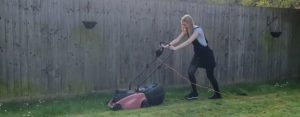


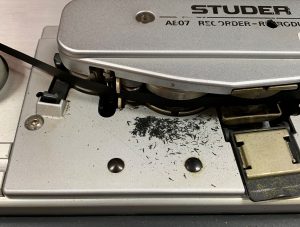
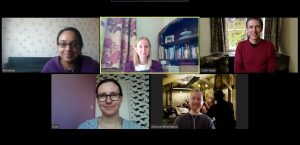
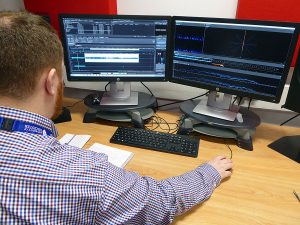
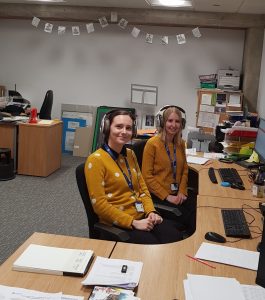
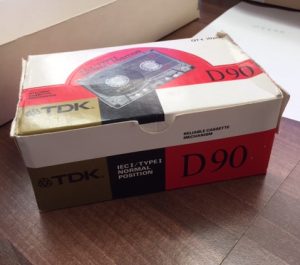
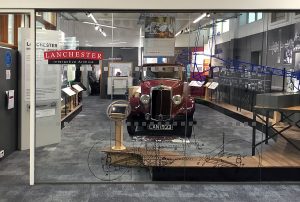
 Subscribe to Sarah Wood's posts
Subscribe to Sarah Wood's posts
Recent Comments